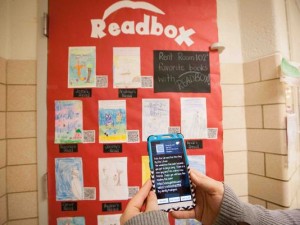The door into Jackie Ewasko’s second grade classroom at Gallaher Elementary should look familiar to anyone who’s checked out a DVD from a Redbox kiosk.
On a red background, the “Readbox” has pictures drawn by her students to illustrate a book they read. Next to each is a QR code which, when scanned with a smartphone or similar device, brings up a review the student wrote and links to websites and YouTube videos about the book.
The Readbox is the class’s entry in a door-decorating contest the school had as part of I Love to Read Month, a campaign to get students excited about reading.
“In my room, I really push how reading should be fun and enjoyable. I want them to explore all kinds of different books,” Ewasko said. “We talked about decorating our book for just one story, but everybody had different ideas. So we came up with something that said, hey, there’s a book for everybody!”
The door-decorating contest is only one of several events that have happened at Gallaher over the past few weeks. The school worked with Heifer International, a charity organization that provides animals to poverty and famine-stricken countries, and it’s “Read to Feed” program.
Students got “sponsors,” who pledged small amounts of money if kids read a certain amount. Students were able to pick certain animals out of a catalog and attempt to raise enough money to purchase one for a needy family.
The school invited two children’s authors, Jill Perry and Lynne Silber, to the school to talk with students about the books they wrote and read to them.
“We really wanted them to read, to write, to draw, to think and know that they can do it,” said school librarian Molly Keohane. “You don’t have to be somebody extraordinary to be successful.”
Delaware has been making a push over the past year or so to boost literacy for students, focusing especially on making sure students are reading at grade-level by the third grade.
If students aren’t reading as well as they should by that time, they will often have a much more difficult time understand class assignments and are more likely to get frustrated. In the short term, that leads to low grades and even behavioral problems, but in the long term it can mean dropping out of school.
Keohane said one of the best ways to do that is to continuously read to kids or, once they are able, have them read themselves and discuss what they learned.
“Children learn by communication. You have to talk to them,” she said. “They have to hear the language, hear the flow of words.”
And Ewasko said it’s important to let kids read for pleasure as well as school.
“If you only have them reading these texts for assignments, it sucks the joy out of it,” she said. “I want my students to have a love for learning and a love for reading, no matter kind it is.”
